Unit 2 Section B(3a-Self Check)课件(2024-2025学年人教八上英语Unit 2 How often do you exercise?)
文档属性
| 名称 | Unit 2 Section B(3a-Self Check)课件(2024-2025学年人教八上英语Unit 2 How often do you exercise?) |

|
|
| 格式 | pptx | ||
| 文件大小 | 55.7MB | ||
| 资源类型 | 试卷 | ||
| 版本资源 | 人教新目标(Go for it)版 | ||
| 科目 | 英语 | ||
| 更新时间 | 2024-09-06 00:00:00 | ||
图片预览

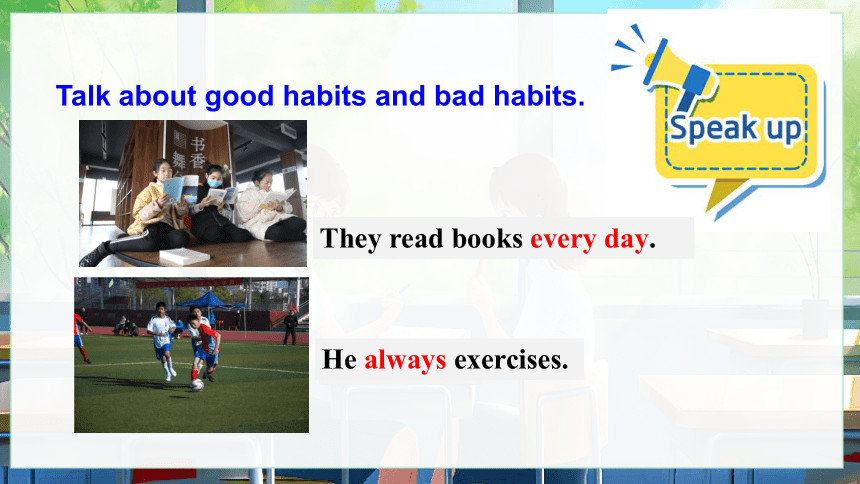
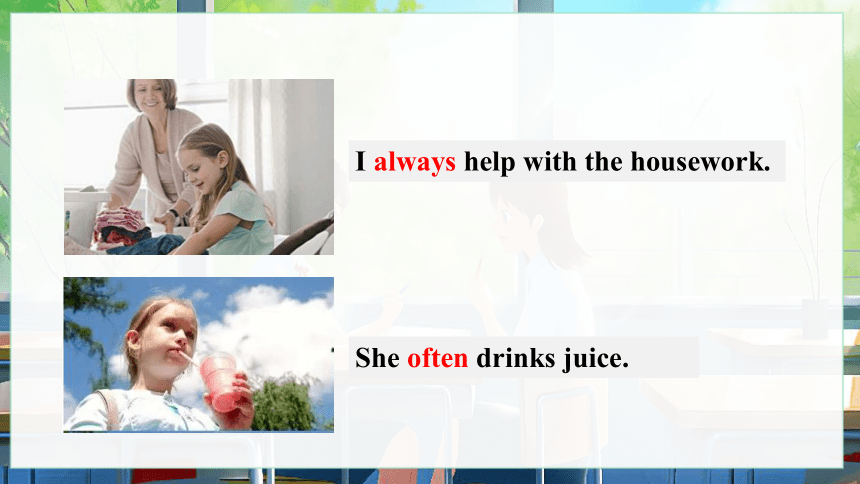
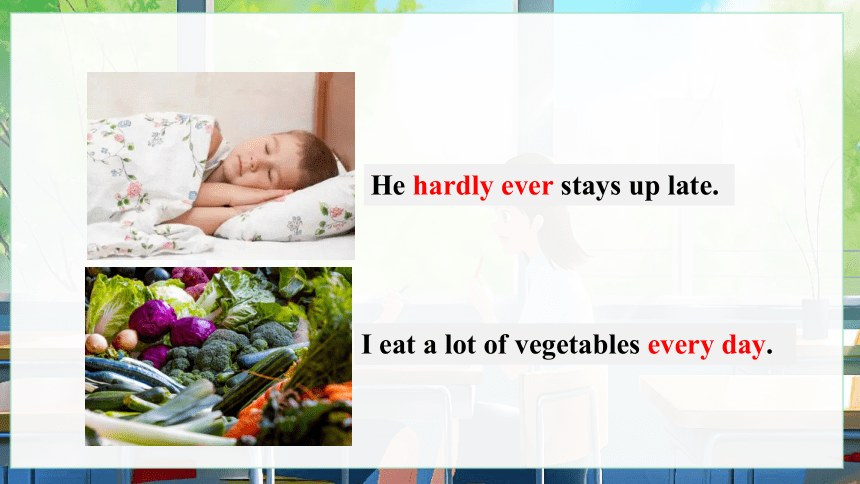
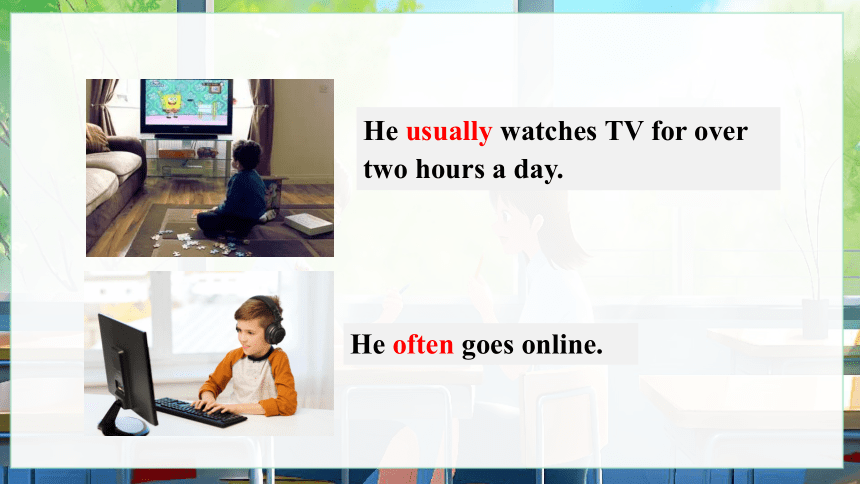
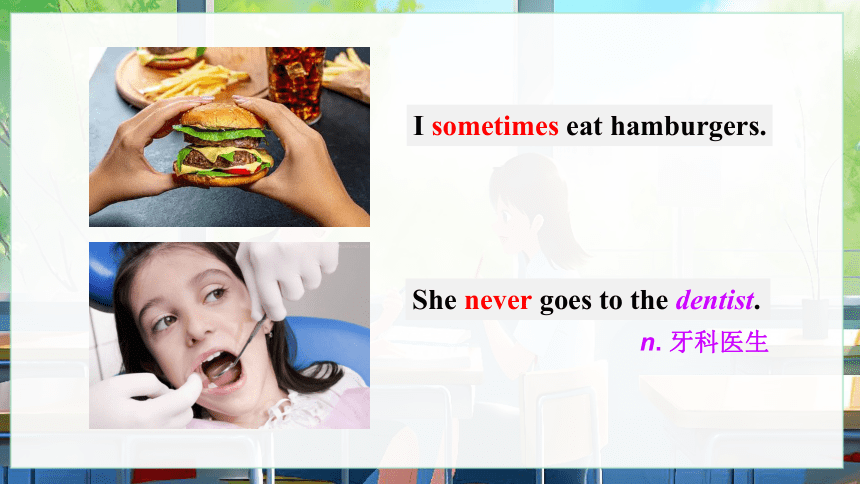
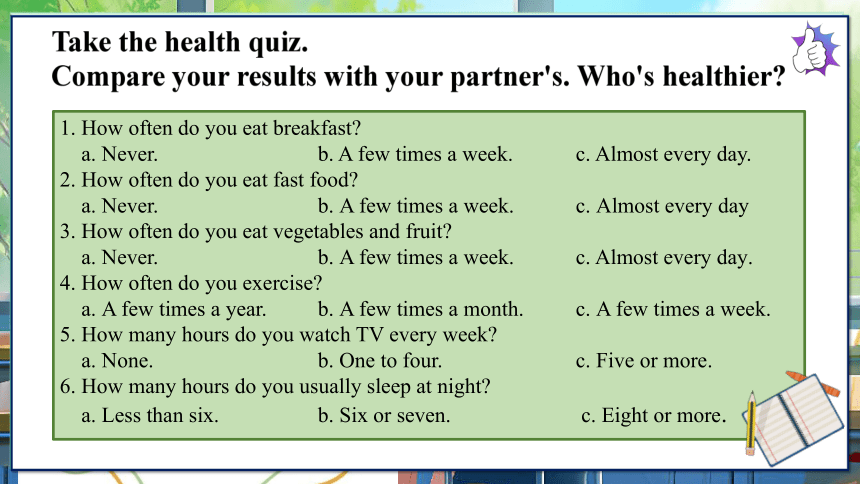
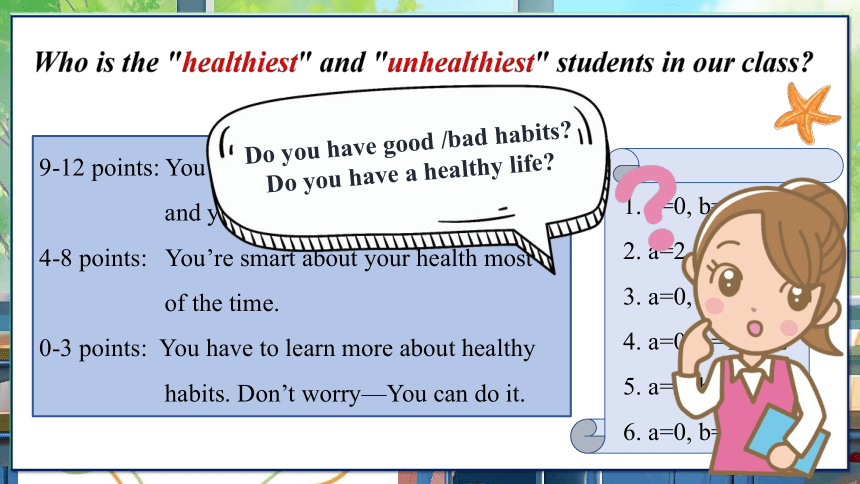
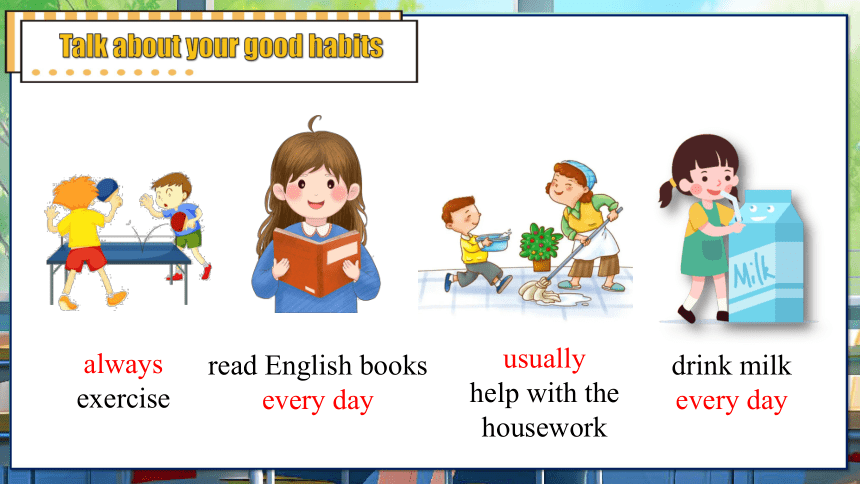
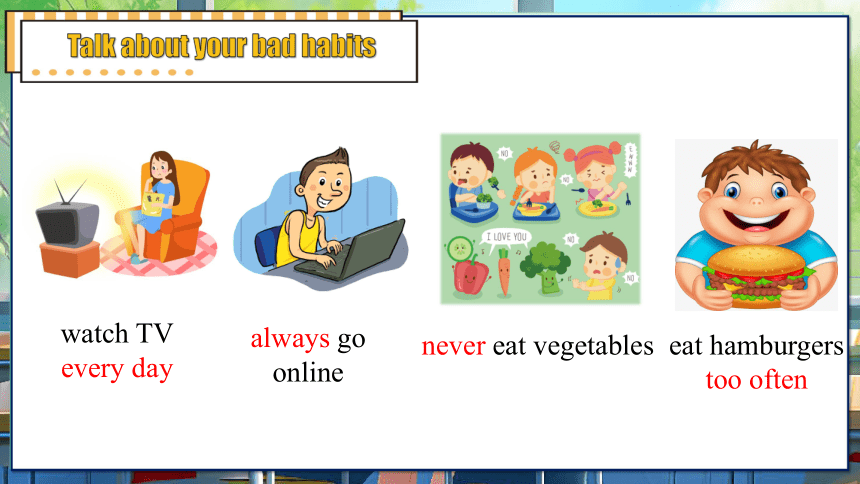
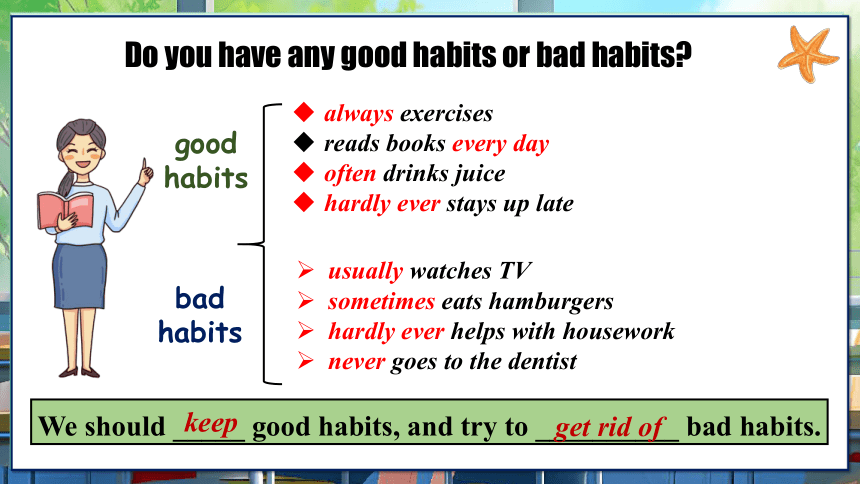
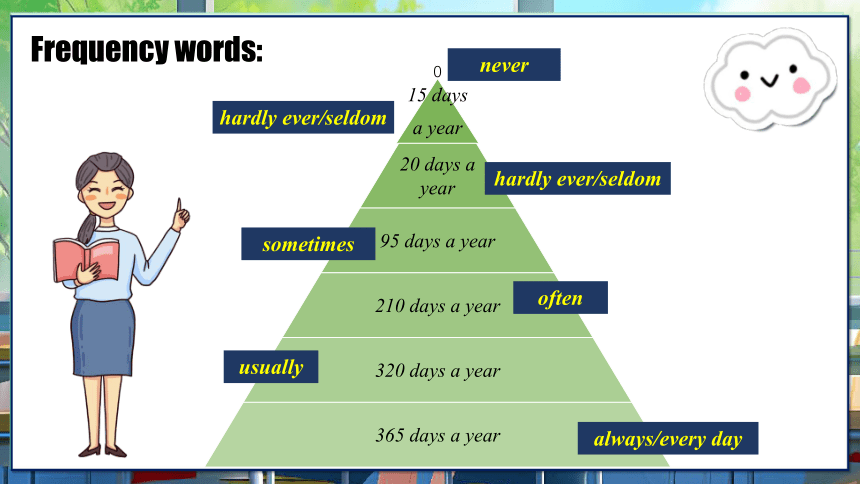
文档简介
(共57张PPT)
Unit2
How often do you exercise
Section B (3a-Self Check)
Talk about good habits and bad habits.
They read books every day.
He always exercises.
I always help with the housework.
She often drinks juice.
He hardly ever stays up late.
I eat a lot of vegetables every day.
He often goes online.
He usually watches TV for over two hours a day.
She never goes to the dentist.
I sometimes eat hamburgers.
n. 牙科医生
Take the health quiz.
Compare your results with your partner's. Who's healthier
1. How often do you eat breakfast
a. Never. b. A few times a week. c. Almost every day.
2. How often do you eat fast food
a. Never. b. A few times a week. c. Almost every day
3. How often do you eat vegetables and fruit
a. Never. b. A few times a week. c. Almost every day.
4. How often do you exercise
a. A few times a year. b. A few times a month. c. A few times a week.
5. How many hours do you watch TV every week
a. None. b. One to four. c. Five or more.
6. How many hours do you usually sleep at night
a. Less than six. b. Six or seven. c. Eight or more.
9-12 points: You’re really healthy! Good for you—
and your health!
4-8 points: You’re smart about your health most
of the time.
0-3 points: You have to learn more about healthy
habits. Don’t worry—You can do it.
1. a=0, b=1, c=2
2. a=2, b=1, c=0
3. a=0, b=1, c=2
4. a=0, b=1, c=2
5. a=2, b=1, c=0
6. a=0, b=1, c=2
Who is the "healthiest" and "unhealthiest" students in our class
Do you have good /bad habits
Do you have a healthy life
read English books
every day
always exercise
usually
help with the housework
drink milk
every day
Talk about your good habits
always go online
eat hamburgers too often
watch TV
every day
never eat vegetables
Talk about your bad habits
always exercises
reads books every day
often drinks juice
hardly ever stays up late
usually watches TV
sometimes eats hamburgers
hardly ever helps with housework
never goes to the dentist
good
habits
bad
habits
Do you have any good habits or bad habits
We should _____ good habits, and try to __________ bad habits.
keep
get rid of
0
never
hardly ever/seldom
hardly ever/seldom
sometimes
often
usually
always/every day
Frequency words:
Jane
How often does she...
always/every day
always/every day
usually
often
sometimes
seldom
hardly ever
never
Look at the chart about Jane carefully and answer the questions.
1. What information can you find in the chart
2. What does the heading “Days a year” mean
3. What good habits does the girl have
4. Does the girl have any bad habits What are they
Jane
always exercises
reads books every day
often drinks juice
hardly ever stays up late
usually watches TV for over 2 hours
sometimes eats hamburgers
hardly ever helps with housework
never goes to the dentist
good habits
bad habits
Jane is a 16-year-old high school student in the United States. American Teenager magazine asked her about her habits. Jane has a lot of good habits. She always exercises and she reads books ________. Also, she _______drinks juice and she ________________stays up late. However, she has some bad habits, too. She _______ watches TV for more than two hours a day, and she _________ eats hamburgers. Her parents are not very happy because she _______________helps with housework and she _______ goes to the dentist for teeth cleaning. She says she is afraid!
every day
often
usually
sometimes
hardly ever/seldom
never
hardly ever/seldom
3a
Look at the information in the chart and complete the report.
What’s the topic(话题) of
this article
What do parts 2&3 talk about
Tip 1:
The topic is usually at the beginning (开头).
Tip 2:
Pay attention to the first sentence.
Read Parts 2&3 and underline (划线) Jane's habits.
good habits
bad habits
1. Jane hardly helps with housework. What do her parents think of it
Not happy.
2. Why doesn't she go to the dentist
Afraid.
Opinions
(观点)
Opinions make the article vivid (生动的).
1. Read it aloud together.
2. Find out the missing words.
3. Read it again and find out more linking words.
Linking words can make
the article more fluent.
连接词能使文章更流畅。
Jane is a 16-year-old high school student in the United States. American Teenager magazine asked her about her habits.
Jane has a lot of good habits. She always exercises and she reads books ________. Also, she ________drinks juice and she __________ stays up late.
However, she has some bad habits, too. She _______ watches TV for more than two hours a day, and she __________ eats hamburgers. Her parents are not very happy because she ______ ______helps with housework and she ______ goes to the dentist for teeth cleaning. She says she is afraid.
every day
often
hardly ever
usually
sometimes
hardly
ever
never
Read and find out the structure of the passage.
No ending
Body
Beginning
姓名、年龄、身份、国籍, 事件
饮食、学习、健身、家务、休闲、好习惯、坏习惯
A possible ending
Everyone has different habits. We should keep the good habits and try to change or say “No” to the bad ones.
My
Habits
What will the structure of the passage be like
Beginning
Body
Ending
How can we make our passage vivid and attractive
Jane is a 16-year-old high school student in the United States. American Teenager magazine asked her about her habits.
Jane has a lot of good habits. She always exercises and she reads books every day. Also, she often drinks juice and she hardly ever stays up late. However, she has some bad habits, too. She usually watches TV for more than two hours a day, and she sometimes eat hamburgers. Her parents are not very happy because she sometimes helps with housework and she never goes to the dentist for teeth cleaning. She says she is afraid!
Tip 1
topic sentence
主题句可以使文章层次更清晰。
Jane is a 16-year-old high school student in the United States. American Teenager magazine asked her about her habits.
Jane has a lot of good habits. She always exercises and she reads books every day. Also, she often drinks juice and she hardly ever stays up late. However, she has some bad habits, too. She usually watches TV for more than two hours a day, and she sometimes eat hamburgers. Her parents are not very happy because she sometimes helps with housework and she never goes to the dentist for teeth cleaning. She says she is afraid!
Tip 2
连词(并列关系,因果关系,转折关系)可以使段与段,句与句之间逻辑更加清楚。
Jane is a 16-year-old high school student in the United States. American Teenager magazine asked her about her habits.
Jane has a lot of good habits. She always exercises and she reads books every day. Also, she often drinks juice and she hardly ever stays up late. However, she has some bad habits, too. She usually watches TV for more than two hours a day, and she sometimes eat hamburgers. Her parents are not very happy because she sometimes helps with housework and she never goes to the dentist for teeth cleaning. She says she is afraid!
Tip 3
加入别人的评价或者观点,可以使文章更加丰富,更有吸引力。
3b
Complete the chart with your own information. In the last column, use expressions like always, every day, twice a week and never.
Habits Activities How often
Good habits
every day
always
every day
never
four times a week
Exercise
Read books
Eat fruit
Drink milk
Stay up late…
Habits Activities How often
Bad habits Watch TV for over 2 hours Use the Internet Eat hamburgers Help with housework Go to the dentist…
always
often
every day
hardly ever
never
What do you think of good habits
They are good for my health.
They are healthy for the mind and the body.
A healthy lifestyle helps me get good grades.
Discussion
What do you think of bad habits
They are bad for my health.
We should say “No” to the bad habits.
They are not good for my study.
We should get rid of the bad habits.
Discussion
3c
Write a report about your good and bad habits. Say how often you do things. Use the report in 3a as an example.
【思路点拨】 Step Idea Expression
1 引出话题 Everyone has his own habits. Here are my good habits and bad habits.
2 描述习惯 I have some good habits. I always…
However, I have some bad habits. I often…
3 归纳总结 As students, we should have some good habits. They are
good for our health.
Write a report about your good and bad habits. Say how often you do things. Use the report in 3a as an example.
体裁:介绍自己的好习惯和坏习惯
文体:说明文
时态:介绍日常习惯时,用一般现在时。
人称:第一人称
语块
习惯(生活、学习) 具体内容 频率
好习惯 ▲exercise / play sports, go running / do some running, (1)_____________________ (帮助做家务), drink water / juice instead of (而不是) cola or drinks, eat fruit and vegetables instead of junk food, (2)________________(去看牙医), brush teeth, (almost) every
day, once / twice
a week / month, three / four / ... times a week,
(3)_____________(几乎从不), never, always, usually,
often, sometime
hardly ever
help with housework
go to the dentist
习惯 (生活、学习) 具体内容 频率
好习惯 (4)___________________ _________ (早睡早起), wash hands before and after a meal, throw waste in the bin (把废物扔进垃圾桶), keep the house clean, keep your desk tidy, get enough sleep and rest (almost) every
day, once / twice
a week / month, three / four / ... times a week,
hardly ever, never, always, usually, often, sometime
get up early and go to
bed early
习惯 (生活、学习) 具体内容 频率
好习惯 ▲go to the library to read, plan (计划) your time wisely (明智地), take notes (做笔记), (5)______________________ (按时完成作业), listen to the teacher carefully (认真地), review (复习) your notes after class, bring your homework to school, ask the teacher questions (almost) every
day, once / twice
a week / month, three / four / ... times a week,
hardly ever, never, always, usually, often, sometime
finish homework on time
习惯(生活、学习) 具体内容 频率
坏习惯 ▲本身对健康有害 (6)____________(熬夜), eat junk food or fast food, play games on mobile phone in bed, read in moving cars, don't finish homework on time, don't listen in class ▲由于频率高而对自己不利 watch TV, eat candy, (7)______________(使用互联网), play computer games, eat hamburgers all day, always,
often, every day, (8)_____________
____________(三个多小时)
three hours
stay up late
use the Internet
more than/over
I have some good / bad habits such as ...
It's good for my health.
I hardly ever / often / never ...
I … three times / ... a week.
It's not easy to give up (放弃) bad habits.
As the saying goes, never leave today's work until tomorrow.
The early bird catches the worm (早起的鸟儿有虫吃).
It's never too late to learn.
An apple a day keeps the doctor away.
句型
巧衔接
罗列好习惯和坏习惯时可用and, also等词作为列举的连接纽带,从写好习惯转到写坏习惯时可用however作为对比和转折的连接纽带。
添佳句
Good habits will benefit people forever.
好习惯使人终生受益。
Old habits die hard, so I’ll start changing before it’s too late!
旧习难改,因此我会尽早改。
【谋篇布局】
引出话题
Good morning, everyone. I want to tell you about some of my habits here.
介绍“我”的好习惯及理由
I have some good habits. I like playing sports, so I (1)_____________________________(几乎每天打篮球) after school. I never stay up late because (2)______________________ (这对我的健康不利). What's more, I take notes carefully in class. I think it can (3)___________________________(帮我记住一切) the teacher says.
play basketball almost every day
it's not good for my health
help me remember everything
介绍“我”的坏习惯及改正决心
However, I have some bad habits, too. (4)_____________ __________(我几乎从不吃水果). I know an apple a day makes the doctor away, so I am going to eat more fruit from now on. Also, I (5)_______________(经常看电视) after dinner and sometimes I almost forget to do my homework.
结尾
Old habits die hard, but it's never too late to give them up. As for my good habits, I will try to keep them.
That's all. Thank you.
often watch TV
I hardly ever
eat fruit
Everyone has his own habits. Here are my good and bad habits.
I have a lot of good habits. I drink milk every day and I usually run in the morning. I like reading. I go to the library twice a week. Also, I never stay up late and I sleep for at least eight hours at night. I hardly ever eat junk food because they are not good for my health.
However, I have some bad habits, too. I never help Mom with housework. I hardly ever eat fruit. I often surf the Internet after school. And I always watch TV for more than two hours a day.
Old habits die hard. So l will start changing before it’s too late.
Sample 1
I’m a 13-year-old middle school student in China. Let me tell you something about my habits.
I have a lot of good habits. I usually arrive at school on time and I always do my homework carefully. Also, I hardly ever stay up late. Moreover, I drink milk every day and I never drink coffee. However, I have some bad habits, too. I often play computer games for more than two hours a day. I eat chocolate four or five times a week.
I hope I can get rid of my bad habits and make my life much better and healthier.
Sample 2
none & no one
【观察】观察例子,思考none和no one有什么不同,补全结论部分所缺的内容。
1) —How many dogs can you see
—None.
2) None of my children has / have blonde hair.
3) —How much time did you spend there yesterday
—None.
4) —Who likes to join the chess club
—No one.
5) No one wants to die.
6) None of this money is mine.
【结论】
1) none和no one都有“一个也没有”的意思。
2) _______ 既可以指人,也可以指物。可单独使用,也可以和of连用,后跟可数名词复数或不可数名词。作主语时,谓语动词可用单数也可用复数。
3) _______只能指人,不能指物。一般单独使用,不和of连用。作主语时,谓语动词用_______数。
4) _______可用于回答how many / how much开头的提问,而_______则回答who开头的提问。
none
no one
no one
单
none
【语境应用】根据语境选择恰当的选项填空。
1) —How many cakes are there in the fridge
—________ (None / No one).
2) ________ (None / No one) of us went to the meeting yesterday.
3) —Who was late today
—________ (None / No one).
No one
None
None
I My mother/father
always
usually
often
sometimes
hardly ever
never
1. Complete the chart with activities you do and don’t do. What about your mother/father
play basketball
play chess
read books
read newspapers
eat hamburgers
eat vegetables
drink juice
drink tea
watch TV
use the Internet
stay up late
stay up late
2. Write five sentences using the information above.
5. I hardly ever watch TV.
1. I always play basketball after school.
2. My father always plays chess on weekends.
3. I usually read books on weekends.
4. My father sometimes drinks tea.
6. My father never stays up late.
A: What do Tom and Mike __________ do on weekends
B: They sometimes go to the museum.
A: __________ do they go to the shopping center
B: __________ ever. Maybe about twice a month.
usually
How often
Hardly
3. Fill in the blanks in the conversation.
A: ___________ do they watch TV
B: Mike never watches TV, but Tom watches TV _________ day.
A: Oh, I’m just like Tom. I _________ watch TV, too.
How often
every
always
exercise, read, help with housework, shop (go shopping), go to the movies, watch TV, use the Internet, have piano lessons, play sports, play computer games
Activities
Daily habits
Frequency
Structures
drink milk/coffee/ juice, eat junk food /fruit/vegetables, sleep, stay up late
always, usually, often, sometimes, hardly ever, never; once, twice, one or two times a week, every day
A: What do you usually do on weekends
B: I always exercise.
A: How often do you go to the movies
B: I go to the movies maybe once a month.
A: Does he go shopping
B: No, he never goes shopping.
Free time activities
I. 根据语境及所给首字母提示或汉语提示,补全所缺单词。
1. I have a toothache (牙痛). I have to go to the d_______.
2. There are three dictionaries, but n_____ of them is mine.
3. David writes short stories for some __________(杂志).
4. They won (赢) the game by five ________(得分) to three.
dentist
magazines
points
5. I like this model car. _________(然而), I don't have money to buy it.
6. ________(几乎) everything was lost in the fire.
However
Almost
none
II. 根据内容从方框中选择恰当的单词填空,注意形式变化。
Do you know about a woman called Zheng Xuan She is China's first deaf doctor of linguistics (听障者语言学博士). She is good at Chinese Sign Language (中国手语) and American Sign Language. Now she is teaching at a university (大学) in Chongqing.
Zheng Xuan became deaf as a(n) (1)_______ of a medical accident (医疗事故) when she was only two years old.
Internet, result, magazine, however, although, together, almost, online, hardly, make
result
To make her speak, her grandmother stopped working and came to live (2)_________ with her. She spent (3)_________ all her time teaching the little girl to speak. After four years of hard work, Zheng Xuan started to speak.
When Zheng Xuan was young, she enjoyed reading picture books and (4)_________ like other children. At the age of six, she started school. She was very smart. (5)_________ she was deaf, she still did very well in all her lessons. In 1998, she started to study at Wuhan University.
Internet, result, magazine, however, although, together, almost, online, hardly, make
together
almost
magazines
Although
She met some other deaf people and (6)_______ friends with them. The next year, she learned to use the (7)_______. From then on, she often went (8)_______ and talked with her deaf friends.
In 2009, Zheng Xuan became a university teacher in Chongqing and started to teach her students sign language. She is often very busy with her work and (9)_______ has any time to relax. (10)_______, she always spares (匀出) some of her time for deaf people and helps them.
Internet, result, magazine, however, although, together, almost, online, hardly, make
made
Internet
online
hardly
However
Motivation is what gets
you started. Habit is what keeps you going.
动力使你开始,习惯让你坚持。
Homework
1. Polish your passage.
2. Review the new words
and expressions in Unit 2.
Unit2
How often do you exercise
Section B (3a-Self Check)
Talk about good habits and bad habits.
They read books every day.
He always exercises.
I always help with the housework.
She often drinks juice.
He hardly ever stays up late.
I eat a lot of vegetables every day.
He often goes online.
He usually watches TV for over two hours a day.
She never goes to the dentist.
I sometimes eat hamburgers.
n. 牙科医生
Take the health quiz.
Compare your results with your partner's. Who's healthier
1. How often do you eat breakfast
a. Never. b. A few times a week. c. Almost every day.
2. How often do you eat fast food
a. Never. b. A few times a week. c. Almost every day
3. How often do you eat vegetables and fruit
a. Never. b. A few times a week. c. Almost every day.
4. How often do you exercise
a. A few times a year. b. A few times a month. c. A few times a week.
5. How many hours do you watch TV every week
a. None. b. One to four. c. Five or more.
6. How many hours do you usually sleep at night
a. Less than six. b. Six or seven. c. Eight or more.
9-12 points: You’re really healthy! Good for you—
and your health!
4-8 points: You’re smart about your health most
of the time.
0-3 points: You have to learn more about healthy
habits. Don’t worry—You can do it.
1. a=0, b=1, c=2
2. a=2, b=1, c=0
3. a=0, b=1, c=2
4. a=0, b=1, c=2
5. a=2, b=1, c=0
6. a=0, b=1, c=2
Who is the "healthiest" and "unhealthiest" students in our class
Do you have good /bad habits
Do you have a healthy life
read English books
every day
always exercise
usually
help with the housework
drink milk
every day
Talk about your good habits
always go online
eat hamburgers too often
watch TV
every day
never eat vegetables
Talk about your bad habits
always exercises
reads books every day
often drinks juice
hardly ever stays up late
usually watches TV
sometimes eats hamburgers
hardly ever helps with housework
never goes to the dentist
good
habits
bad
habits
Do you have any good habits or bad habits
We should _____ good habits, and try to __________ bad habits.
keep
get rid of
0
never
hardly ever/seldom
hardly ever/seldom
sometimes
often
usually
always/every day
Frequency words:
Jane
How often does she...
always/every day
always/every day
usually
often
sometimes
seldom
hardly ever
never
Look at the chart about Jane carefully and answer the questions.
1. What information can you find in the chart
2. What does the heading “Days a year” mean
3. What good habits does the girl have
4. Does the girl have any bad habits What are they
Jane
always exercises
reads books every day
often drinks juice
hardly ever stays up late
usually watches TV for over 2 hours
sometimes eats hamburgers
hardly ever helps with housework
never goes to the dentist
good habits
bad habits
Jane is a 16-year-old high school student in the United States. American Teenager magazine asked her about her habits. Jane has a lot of good habits. She always exercises and she reads books ________. Also, she _______drinks juice and she ________________stays up late. However, she has some bad habits, too. She _______ watches TV for more than two hours a day, and she _________ eats hamburgers. Her parents are not very happy because she _______________helps with housework and she _______ goes to the dentist for teeth cleaning. She says she is afraid!
every day
often
usually
sometimes
hardly ever/seldom
never
hardly ever/seldom
3a
Look at the information in the chart and complete the report.
What’s the topic(话题) of
this article
What do parts 2&3 talk about
Tip 1:
The topic is usually at the beginning (开头).
Tip 2:
Pay attention to the first sentence.
Read Parts 2&3 and underline (划线) Jane's habits.
good habits
bad habits
1. Jane hardly helps with housework. What do her parents think of it
Not happy.
2. Why doesn't she go to the dentist
Afraid.
Opinions
(观点)
Opinions make the article vivid (生动的).
1. Read it aloud together.
2. Find out the missing words.
3. Read it again and find out more linking words.
Linking words can make
the article more fluent.
连接词能使文章更流畅。
Jane is a 16-year-old high school student in the United States. American Teenager magazine asked her about her habits.
Jane has a lot of good habits. She always exercises and she reads books ________. Also, she ________drinks juice and she __________ stays up late.
However, she has some bad habits, too. She _______ watches TV for more than two hours a day, and she __________ eats hamburgers. Her parents are not very happy because she ______ ______helps with housework and she ______ goes to the dentist for teeth cleaning. She says she is afraid.
every day
often
hardly ever
usually
sometimes
hardly
ever
never
Read and find out the structure of the passage.
No ending
Body
Beginning
姓名、年龄、身份、国籍, 事件
饮食、学习、健身、家务、休闲、好习惯、坏习惯
A possible ending
Everyone has different habits. We should keep the good habits and try to change or say “No” to the bad ones.
My
Habits
What will the structure of the passage be like
Beginning
Body
Ending
How can we make our passage vivid and attractive
Jane is a 16-year-old high school student in the United States. American Teenager magazine asked her about her habits.
Jane has a lot of good habits. She always exercises and she reads books every day. Also, she often drinks juice and she hardly ever stays up late. However, she has some bad habits, too. She usually watches TV for more than two hours a day, and she sometimes eat hamburgers. Her parents are not very happy because she sometimes helps with housework and she never goes to the dentist for teeth cleaning. She says she is afraid!
Tip 1
topic sentence
主题句可以使文章层次更清晰。
Jane is a 16-year-old high school student in the United States. American Teenager magazine asked her about her habits.
Jane has a lot of good habits. She always exercises and she reads books every day. Also, she often drinks juice and she hardly ever stays up late. However, she has some bad habits, too. She usually watches TV for more than two hours a day, and she sometimes eat hamburgers. Her parents are not very happy because she sometimes helps with housework and she never goes to the dentist for teeth cleaning. She says she is afraid!
Tip 2
连词(并列关系,因果关系,转折关系)可以使段与段,句与句之间逻辑更加清楚。
Jane is a 16-year-old high school student in the United States. American Teenager magazine asked her about her habits.
Jane has a lot of good habits. She always exercises and she reads books every day. Also, she often drinks juice and she hardly ever stays up late. However, she has some bad habits, too. She usually watches TV for more than two hours a day, and she sometimes eat hamburgers. Her parents are not very happy because she sometimes helps with housework and she never goes to the dentist for teeth cleaning. She says she is afraid!
Tip 3
加入别人的评价或者观点,可以使文章更加丰富,更有吸引力。
3b
Complete the chart with your own information. In the last column, use expressions like always, every day, twice a week and never.
Habits Activities How often
Good habits
every day
always
every day
never
four times a week
Exercise
Read books
Eat fruit
Drink milk
Stay up late…
Habits Activities How often
Bad habits Watch TV for over 2 hours Use the Internet Eat hamburgers Help with housework Go to the dentist…
always
often
every day
hardly ever
never
What do you think of good habits
They are good for my health.
They are healthy for the mind and the body.
A healthy lifestyle helps me get good grades.
Discussion
What do you think of bad habits
They are bad for my health.
We should say “No” to the bad habits.
They are not good for my study.
We should get rid of the bad habits.
Discussion
3c
Write a report about your good and bad habits. Say how often you do things. Use the report in 3a as an example.
【思路点拨】 Step Idea Expression
1 引出话题 Everyone has his own habits. Here are my good habits and bad habits.
2 描述习惯 I have some good habits. I always…
However, I have some bad habits. I often…
3 归纳总结 As students, we should have some good habits. They are
good for our health.
Write a report about your good and bad habits. Say how often you do things. Use the report in 3a as an example.
体裁:介绍自己的好习惯和坏习惯
文体:说明文
时态:介绍日常习惯时,用一般现在时。
人称:第一人称
语块
习惯(生活、学习) 具体内容 频率
好习惯 ▲exercise / play sports, go running / do some running, (1)_____________________ (帮助做家务), drink water / juice instead of (而不是) cola or drinks, eat fruit and vegetables instead of junk food, (2)________________(去看牙医), brush teeth, (almost) every
day, once / twice
a week / month, three / four / ... times a week,
(3)_____________(几乎从不), never, always, usually,
often, sometime
hardly ever
help with housework
go to the dentist
习惯 (生活、学习) 具体内容 频率
好习惯 (4)___________________ _________ (早睡早起), wash hands before and after a meal, throw waste in the bin (把废物扔进垃圾桶), keep the house clean, keep your desk tidy, get enough sleep and rest (almost) every
day, once / twice
a week / month, three / four / ... times a week,
hardly ever, never, always, usually, often, sometime
get up early and go to
bed early
习惯 (生活、学习) 具体内容 频率
好习惯 ▲go to the library to read, plan (计划) your time wisely (明智地), take notes (做笔记), (5)______________________ (按时完成作业), listen to the teacher carefully (认真地), review (复习) your notes after class, bring your homework to school, ask the teacher questions (almost) every
day, once / twice
a week / month, three / four / ... times a week,
hardly ever, never, always, usually, often, sometime
finish homework on time
习惯(生活、学习) 具体内容 频率
坏习惯 ▲本身对健康有害 (6)____________(熬夜), eat junk food or fast food, play games on mobile phone in bed, read in moving cars, don't finish homework on time, don't listen in class ▲由于频率高而对自己不利 watch TV, eat candy, (7)______________(使用互联网), play computer games, eat hamburgers all day, always,
often, every day, (8)_____________
____________(三个多小时)
three hours
stay up late
use the Internet
more than/over
I have some good / bad habits such as ...
It's good for my health.
I hardly ever / often / never ...
I … three times / ... a week.
It's not easy to give up (放弃) bad habits.
As the saying goes, never leave today's work until tomorrow.
The early bird catches the worm (早起的鸟儿有虫吃).
It's never too late to learn.
An apple a day keeps the doctor away.
句型
巧衔接
罗列好习惯和坏习惯时可用and, also等词作为列举的连接纽带,从写好习惯转到写坏习惯时可用however作为对比和转折的连接纽带。
添佳句
Good habits will benefit people forever.
好习惯使人终生受益。
Old habits die hard, so I’ll start changing before it’s too late!
旧习难改,因此我会尽早改。
【谋篇布局】
引出话题
Good morning, everyone. I want to tell you about some of my habits here.
介绍“我”的好习惯及理由
I have some good habits. I like playing sports, so I (1)_____________________________(几乎每天打篮球) after school. I never stay up late because (2)______________________ (这对我的健康不利). What's more, I take notes carefully in class. I think it can (3)___________________________(帮我记住一切) the teacher says.
play basketball almost every day
it's not good for my health
help me remember everything
介绍“我”的坏习惯及改正决心
However, I have some bad habits, too. (4)_____________ __________(我几乎从不吃水果). I know an apple a day makes the doctor away, so I am going to eat more fruit from now on. Also, I (5)_______________(经常看电视) after dinner and sometimes I almost forget to do my homework.
结尾
Old habits die hard, but it's never too late to give them up. As for my good habits, I will try to keep them.
That's all. Thank you.
often watch TV
I hardly ever
eat fruit
Everyone has his own habits. Here are my good and bad habits.
I have a lot of good habits. I drink milk every day and I usually run in the morning. I like reading. I go to the library twice a week. Also, I never stay up late and I sleep for at least eight hours at night. I hardly ever eat junk food because they are not good for my health.
However, I have some bad habits, too. I never help Mom with housework. I hardly ever eat fruit. I often surf the Internet after school. And I always watch TV for more than two hours a day.
Old habits die hard. So l will start changing before it’s too late.
Sample 1
I’m a 13-year-old middle school student in China. Let me tell you something about my habits.
I have a lot of good habits. I usually arrive at school on time and I always do my homework carefully. Also, I hardly ever stay up late. Moreover, I drink milk every day and I never drink coffee. However, I have some bad habits, too. I often play computer games for more than two hours a day. I eat chocolate four or five times a week.
I hope I can get rid of my bad habits and make my life much better and healthier.
Sample 2
none & no one
【观察】观察例子,思考none和no one有什么不同,补全结论部分所缺的内容。
1) —How many dogs can you see
—None.
2) None of my children has / have blonde hair.
3) —How much time did you spend there yesterday
—None.
4) —Who likes to join the chess club
—No one.
5) No one wants to die.
6) None of this money is mine.
【结论】
1) none和no one都有“一个也没有”的意思。
2) _______ 既可以指人,也可以指物。可单独使用,也可以和of连用,后跟可数名词复数或不可数名词。作主语时,谓语动词可用单数也可用复数。
3) _______只能指人,不能指物。一般单独使用,不和of连用。作主语时,谓语动词用_______数。
4) _______可用于回答how many / how much开头的提问,而_______则回答who开头的提问。
none
no one
no one
单
none
【语境应用】根据语境选择恰当的选项填空。
1) —How many cakes are there in the fridge
—________ (None / No one).
2) ________ (None / No one) of us went to the meeting yesterday.
3) —Who was late today
—________ (None / No one).
No one
None
None
I My mother/father
always
usually
often
sometimes
hardly ever
never
1. Complete the chart with activities you do and don’t do. What about your mother/father
play basketball
play chess
read books
read newspapers
eat hamburgers
eat vegetables
drink juice
drink tea
watch TV
use the Internet
stay up late
stay up late
2. Write five sentences using the information above.
5. I hardly ever watch TV.
1. I always play basketball after school.
2. My father always plays chess on weekends.
3. I usually read books on weekends.
4. My father sometimes drinks tea.
6. My father never stays up late.
A: What do Tom and Mike __________ do on weekends
B: They sometimes go to the museum.
A: __________ do they go to the shopping center
B: __________ ever. Maybe about twice a month.
usually
How often
Hardly
3. Fill in the blanks in the conversation.
A: ___________ do they watch TV
B: Mike never watches TV, but Tom watches TV _________ day.
A: Oh, I’m just like Tom. I _________ watch TV, too.
How often
every
always
exercise, read, help with housework, shop (go shopping), go to the movies, watch TV, use the Internet, have piano lessons, play sports, play computer games
Activities
Daily habits
Frequency
Structures
drink milk/coffee/ juice, eat junk food /fruit/vegetables, sleep, stay up late
always, usually, often, sometimes, hardly ever, never; once, twice, one or two times a week, every day
A: What do you usually do on weekends
B: I always exercise.
A: How often do you go to the movies
B: I go to the movies maybe once a month.
A: Does he go shopping
B: No, he never goes shopping.
Free time activities
I. 根据语境及所给首字母提示或汉语提示,补全所缺单词。
1. I have a toothache (牙痛). I have to go to the d_______.
2. There are three dictionaries, but n_____ of them is mine.
3. David writes short stories for some __________(杂志).
4. They won (赢) the game by five ________(得分) to three.
dentist
magazines
points
5. I like this model car. _________(然而), I don't have money to buy it.
6. ________(几乎) everything was lost in the fire.
However
Almost
none
II. 根据内容从方框中选择恰当的单词填空,注意形式变化。
Do you know about a woman called Zheng Xuan She is China's first deaf doctor of linguistics (听障者语言学博士). She is good at Chinese Sign Language (中国手语) and American Sign Language. Now she is teaching at a university (大学) in Chongqing.
Zheng Xuan became deaf as a(n) (1)_______ of a medical accident (医疗事故) when she was only two years old.
Internet, result, magazine, however, although, together, almost, online, hardly, make
result
To make her speak, her grandmother stopped working and came to live (2)_________ with her. She spent (3)_________ all her time teaching the little girl to speak. After four years of hard work, Zheng Xuan started to speak.
When Zheng Xuan was young, she enjoyed reading picture books and (4)_________ like other children. At the age of six, she started school. She was very smart. (5)_________ she was deaf, she still did very well in all her lessons. In 1998, she started to study at Wuhan University.
Internet, result, magazine, however, although, together, almost, online, hardly, make
together
almost
magazines
Although
She met some other deaf people and (6)_______ friends with them. The next year, she learned to use the (7)_______. From then on, she often went (8)_______ and talked with her deaf friends.
In 2009, Zheng Xuan became a university teacher in Chongqing and started to teach her students sign language. She is often very busy with her work and (9)_______ has any time to relax. (10)_______, she always spares (匀出) some of her time for deaf people and helps them.
Internet, result, magazine, however, although, together, almost, online, hardly, make
made
Internet
online
hardly
However
Motivation is what gets
you started. Habit is what keeps you going.
动力使你开始,习惯让你坚持。
Homework
1. Polish your passage.
2. Review the new words
and expressions in Unit 2.
同课章节目录
- Unit 1 Where did you go on vacation?
- Section A
- Section B
- Unit 2 How often do you exercise?
- Section A
- Section B
- Unit 3 I'm more outgoing than my sister.
- Section A
- Section B
- Unit 4 What's the best movie theater?
- Section A
- Section B
- Unit 5 Do you want to watch a game show?
- Section A
- Section B
- Unit 6 I'm going to study computer science.
- Section A
- Section B
- Unit 7 Will people have robots?
- Section A
- Section B
- Unit 8 How do you make a banana milk shake?
- Section A
- Section B
- Unit 9 Can you come to my party?
- Section A
- Section B
- Unit 10 If you go to the party, you'll have a grea
- Section A
- Section B
